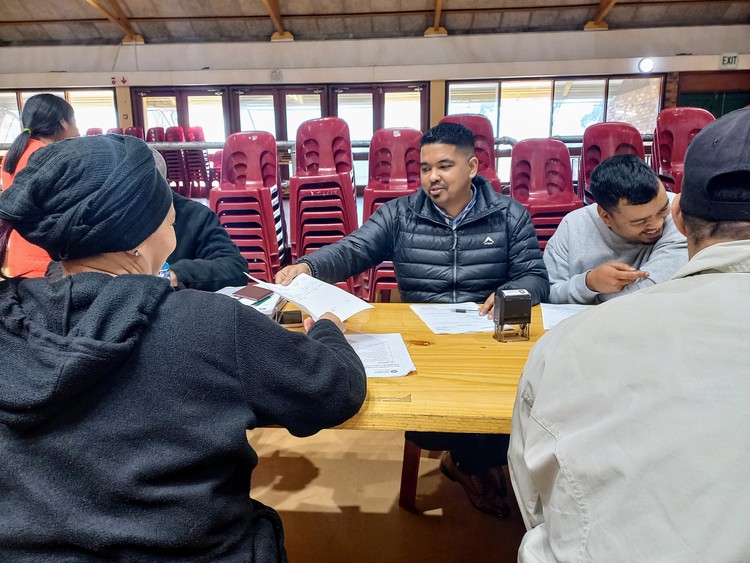Here’s who qualifies for Cape Town’s indigent support and lower rates
The City says it helps more than 40% of households with free basic services
Operations manager for Mitchells Plain and Fezeka, Byron Raynardt (centre), and clerk Abdullah Alexander (right) help people apply for indigent support at the civic centre in Westridge. Photos: Marecia Damons
- The City of Cape Town launched its indigent support and rates relief drive in Mitchells Plain on Thursday.
- Families with total household income of R7,500 or less per month might qualify for a discount on water, sewerage, electricity, and waste collection bills, and on property rates.
- However, the application process has not been easy for many people due to upfront payments and red tape.
- The City says more than 40% of households get free basic services through the indigent support programme. In the 2022/23 financial year, the City allocated R2.3-billion for indigent support and R1.45-billion for rates relief.
The City launched a campaign last week to help those who need it to apply for indigent support and rates relief.
Families with total household income of R7,500 or less per month may qualify for a discount on water, sewerage, electricity, and waste collection bills and on property rates.
During the first day of the campaign, at the Westridge Civic Centre in Mitchells Plain last week, residents, mostly elderly homeowners, came to discuss applications for financial relief. Mayoral Committee Member for Finance Siseko Mbandenzi said that 70 residents attended and of these, 20 applied for indigent support.
GroundUp spoke to 62-year-old Clifford van Heerden from Bothasig. He said he used to benefit from indigent support but when he found work as a technician in 2013, he fell just outside the income threshold. Due to illness he lost his job after just six months and now relies on social grants for himself his 95-year-old mother, his brother, and son aged 27.
Without a steady income, he struggled to pay his municipal accounts. By 2021, his arrears were more than R60,000. When he visited the Milnerton revenue office in January 2021 to reapply for the relief, he was told by officials that he must pay one month’s municipal bill and arrange to pay off his arrears. Finally, he paid R1,800 upfront and is still paying off the arrears.
About 70 people were helped during the Mitchells Plain leg of the drive.
Ward 81 councillor Ashley Potts said homeowners applying for support need to understand that their bills won’t just go away. “People often wait until they get the disconnection notice before they come forward and complain because they have to pay a reconnection fee,” said Potts.
He said residents are often reluctant to complete the application process because they don’t understand which documents are needed. He acknowledged that collecting the correct documents can be frustrating. He said an indigent application takes two to three months to finalise. If applicants cannot visit a revenue office, they can get help from their ward councillor, Potts said.
Some beneficiaries of indigent support fail to renew the application before it expires, and incur debt as a result, said Mbandenzi. In this case they must make payment arrangements for the debt in addition to an upfront payment.
He said indigent support is valid for 12 months but can be withdrawn if the beneficiary no longer meets the criteria.
The City also offers full rates rebates to pensioners and those dependent on social grants.
“If residents are dependent on a pension or a social grant, and are 60 years or older earning R4,500 or less gross income a month, they may qualify for a 100% rates rebate. Pensioners aged 60 years or older earning more than R4,501, but no more than R17,500 a month, may qualify for a 10% - 95% rates rebate,” said Mbandezi.
The rates rebate for pensioners is valid for three-year periods.
Besides indigent support, he said, tenants may qualify for rental housing relief if they rent a property from the City and have an income of R4,500 or less per month.
The City says more than 40% of households get free basic services through the indigent support programme. In the 2022/23 financial year, the City allocated R2.3-billion for indigent relief and R1.45-billion for rates rebates.
The City says it plans to visit other communities during the remainder of the year.
Support independent journalism
Donate using Payfast

Don't miss out on the latest news
We respect your privacy, and promise we won't spam you.
Next: Evicted “park dwellers” seek damages from City of Johannesburg
Previous: Restoring dignity to our courts: the duties of legal practitioners
© 2022 GroundUp. This article is licensed under a Creative Commons Attribution-NoDerivatives 4.0 International License.
You may republish this article, so long as you credit the authors and GroundUp, and do not change the text. Please include a link back to the original article.
We put an invisible pixel in the article so that we can count traffic to republishers. All analytics tools are solely on our servers. We do not give our logs to any third party. Logs are deleted after two weeks. We do not use any IP address identifying information except to count regional traffic. We are solely interested in counting hits, not tracking users. If you republish, please do not delete the invisible pixel.


